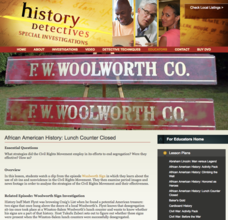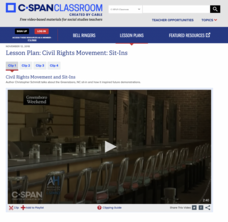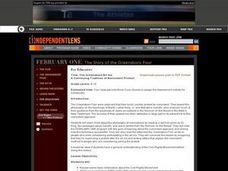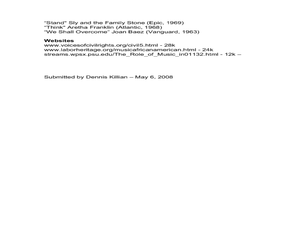PBS
African American History: Lunch Counter Closed
Young historians investigate and evaluate the effectiveness of the strategies the Civil Rights Movement used to end segregation in the United States. After watching an video interview with Carl Matthews and Bill Stevens who participated...
C-SPAN
Civil Rights Movement: Sit-Ins
Part of the protests of the Civil Rights Movement were small scale sit-ins at lunch counters. This form of on-the-ground activism is the focus of a C-SPAN resource that includes four video-clips about the sit-ins by pupils at a lunch...
PBS
Breaking the Code: Actions and Songs of Protest
Ezell Blair, Jr., David Richmond, Franklin McCain and Joseph McNeil changed history. Their sit-in at the lunch counter of the Woolworths in Greensboro, North Carolina on February 1, 1960 became a model for the nonviolent protests that...
Curated OER
The Greensboro Sit-Ins: A Continuing Tradition of Nonviolent Protest
Students watch a video about nonviolent protests during the Civil Rights Movement. They discuss and write about the Greensboro sit-ins while deciding the effectiveness of this type of protest.
Curated OER
Introduction to Selected Documents from the Roxcy Bolton Collection
Students listen to a guided imagery exercise that takes them back to 1969. They brianstorm ideas to try to discover why they would not be allowed to sit at an empty table at a Burdines lunch counter in 1969.
They read letters about the...
Curated OER
Understanding the Music of the Civil Rights Movement
Students examine protest music and songs from the Civil Rights movement. In this music of the Civil Rights era lesson, students listen to selected music before working in groups to determine who the music was directed at, what social...







